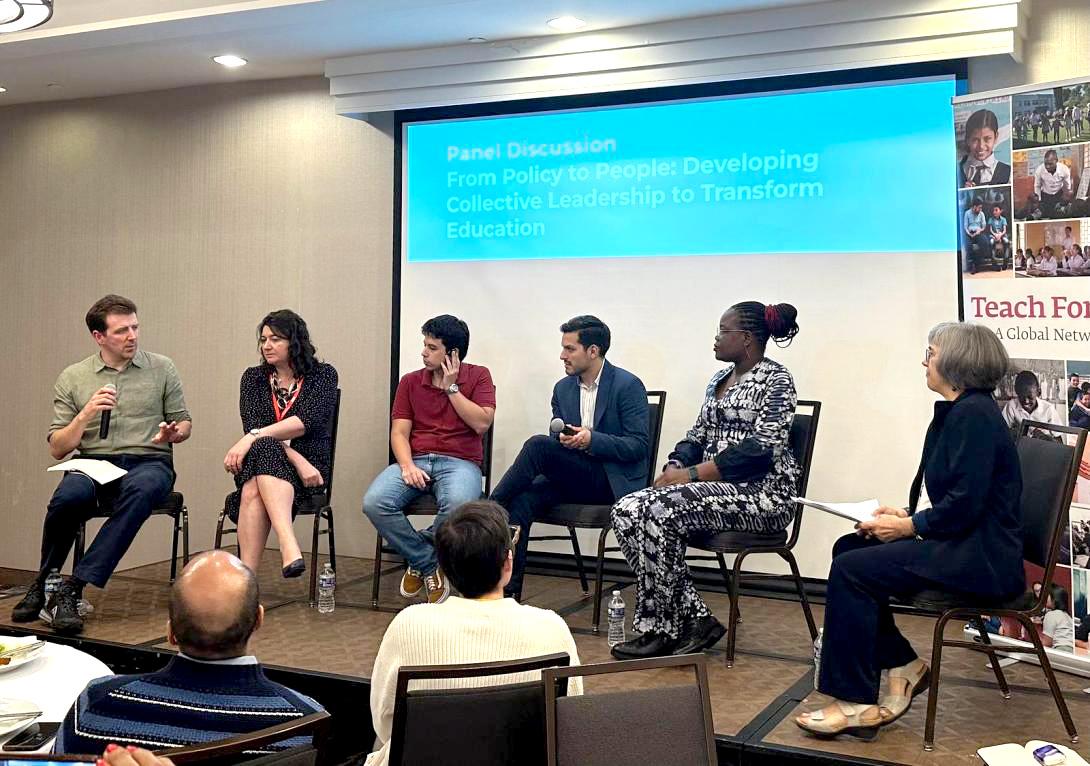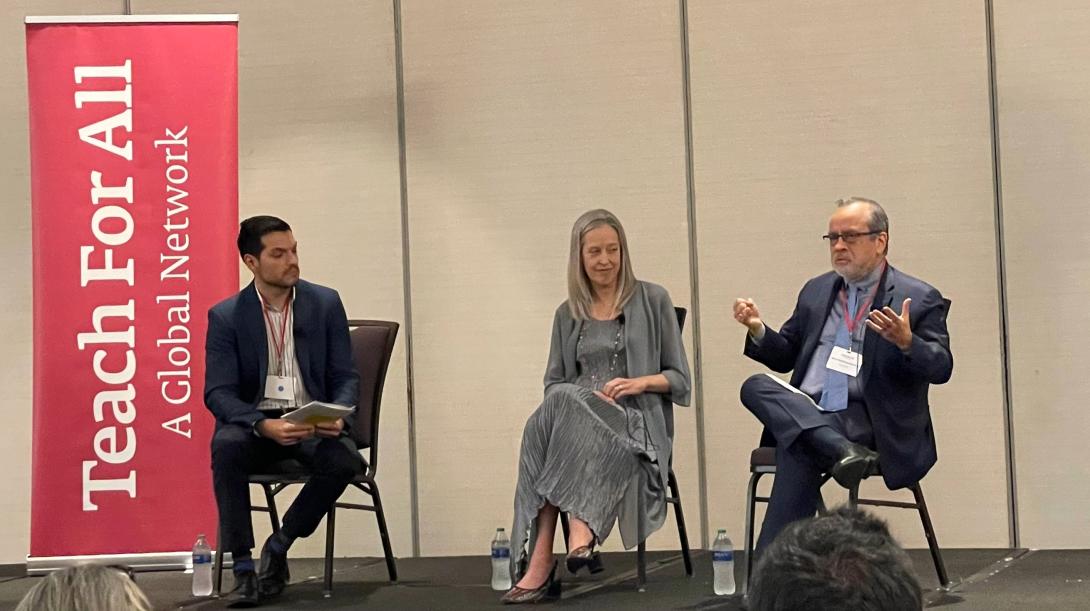Teach For All highlights the need for collective leadership to transform education at CIES 2024

From March 11-March 14th, more than 50 staff members of Teach For All network partners gathered in Miami to attend the Comparative and International Education Symposium (CIES), an annual convening of practitioners, researchers, and donors in international education to advance learning and cross-border sharing of evidence that promotes student learning and collective leadership development for system change. Network attendees participated in a week of events including both official CIES panels and workshops and side sessions hosted by Teach For All designed to advance learning, research, and advocacy.
Network partners and global organization staff members participated in three CIES conference panels. Claudia Gonzalez, CEO of Enseña por Paraguay, and Alvin Vista, Knowledge Lead - Student Outcomes at Teach For All, discussed how the Student Learning Assessment Item Bank developed in partnership with Enseña Ecuador, Enseña por Colombia, and USAID has improved measurement significantly for these Latin American organizations. Enseña por Colombia’s CEO, Ana Medina, presented on a panel focused on supporting migrant and refugee students, where she shared the organization’s approach to ensuring such students have access to quality education in which they are included and their unique needs are met. “All students have capacity within them,” she shared. “What they need is to have their voices heard.”
Network partners also participated in a CIES panel on Teaching As Collective Leadership which discussed how Teach For All's Research and Learning Lab is applying action learning to advance new evidence on developing transformational classrooms that set students on path to becoming leaders of a better future. This panel featured for the first time new research led by Enseña por Colombia on how Teaching As Collective Leadership is inspiring adjustments to their teacher training and support and a new independent impact evaluation of Teach For Nigeria led by RAND, the first-ever study of the Teach For All network in the Africa region. Panelists included Edwin Cuellar, Director of Program of Enseña por Colombia; Bosede Ogidan, Senior Program Manager, Teach For Nigeria; Ale Vasallo, Global Lead of Teaching As Collective Leadership, Teach For All; Robbie Dean, Director of Research and Evaluation, Teach For All; and chaired by Cynthia Boruchowicz, Senior Researcher, Teach For All.

Alongside the CIES sessions, Teach For All hosted several events aimed to engage both members of the network and representatives of the broader education research community. The Americas regional team and the network’s Latin American CEOs hosted a discussion between Teach For All’s CEO Wendy Kopp and Jaime Saavedra, Director of Human Development for Latin America and the Caribbean at the World Bank, moderated by Juan Manuel González, CEO of Enseña por México. The conversation focused on the state of education in the region, and, in light of the recent PISA results, what is needed to tackle the region’s learning crisis with a sense of urgency. In addition to members of the network, the event was attended by representatives of NGOs, multilateral organizations, and business and government leaders who are members of the Latin American diaspora. “There are two ways the Teach For All network is helping to create systemic change: developing leaders and partnering with governments,” Jaime Saavedra remarked, highlighting the importance of collective leadership across sectors. “The world is very complicated and as educators we have the greatest role to play in reshaping it - but it doesn’t end there,” Wendy urged. “We need technical solutions, but what differentiates the systems that are improving is a shared sense of purpose towards students' learning.”
Teach For All hosted the luncheon discussion "From Policy to People: Collective Leadership to Transform Education" featuring new research from the Teach For All network and the People First Community on the role that collective leadership plays in transforming education systems and catalyzing sustainable development. The event marked the launch of The Missing Piece report, a collection of case studies of network partners that are developing collective leadership toward systems change, and presented research from the People First Community’s report Collective Leadership for Sustainable Development Evidence from Research and Practice. Panelists included Bosede Odigan, Senior Program Manager, Teach For Nigeria; Juan Manuel González, CEO of Enseña por México; Franco Mosso, CEO of Enseña Perú; Neli Koleva, Chief Officer of Public Partnerships, Teach For Bulgaria; and Sonia Ospina, Professor Emerita, New York University/Wagner Graduate School of Public Service and a co-author of the People First evidence review. “In this work of transforming education globally, collective leadership development is a missing piece,” remarked the discussion’s moderator, Alex Beard, Head of Teach For All’s Community Impact Lab and author of The Missing Piece report in collaboration with Jean Arkedis, Head of Research at Teach For All, Agnes Tolescu, Senior Associate, Monitoring, Evaluation, Research and Learning at Teach For All, and many others.
Finally, together with the Brookings Institution Center for Universal Education and the What Works Hub for Global Education at Oxford University’s Blavatnik School of Government, Teach For All hosted the discussion "From What Works to How Works" about how to shift paradigms of research and evidence generation to include more practitioner-led action learning and research. More than 100 practitioners, researchers, and global educational leaders joined us for a vibrant discussion in which Jean Arkedis and Franco Mosso shared examples of action learning from the Teach For All network. “We should ask ourselves, who are the practitioners?” Franco said, describing how in the rural communities where they work, Enseña Perú has found taxi drivers and other community members to be powerful sources of data.



